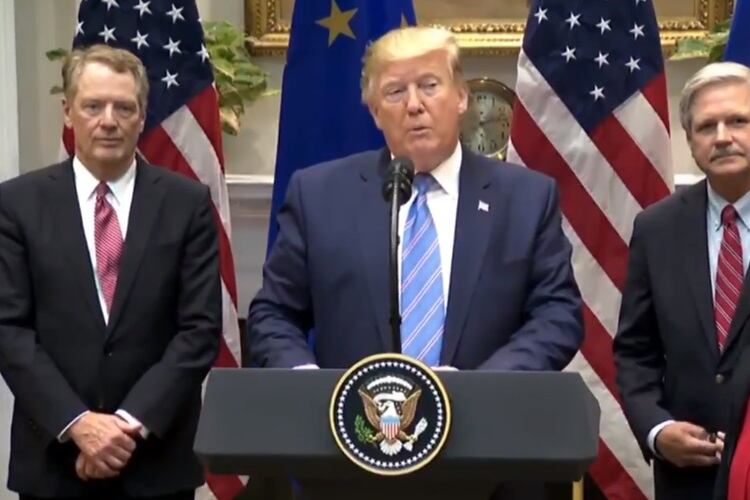Under the deal, agreed in June but signed today (2 Aug), the US will be able to nearly triple its annual duty-free exports of non-hormone beef to the EU over the next seven years. American producers will have an initial duty-free tariff rate quota (TRQ) of 18,500 metric tons annually, valued at approximately $220m. Over seven years, the TRQ will grow to 35,000 metric tons annually, valued at approximately $420mn.
The current agreement limits US duty-free beef exports to the EU to approximately 13,000 metric tons annually, valued at approximately $150m. It will go into effect following the European Parliament’s approval, which is expected this fall.
The overall amount of non-hormone treated beef imported into the EU (45,000 metric tons per year) will not change but rather the US’s quota will increase, with the remaining amount left available for all other exporters.
“American ranchers produce the best beef in the world. Thanks to President Trump’s leadership, this new agreement ensures that American ranchers can sell more of that beef to Europe,” said US Trade Representative Robert Lighthizer, who signed the agreement with the Honorable Jani Raappana of Finland, representing the Presidency of the EU, and Ambassador Stavros Lambrinidis of the delegation of the EU.
When the deal was agreed in June, EU Commissioner for Agriculture Phil Hogan said it would not compromise standards. "With the successful outcome of the negotiations, the Commission has delivered on a very important issue with a major trade partner with which we are engaged in broader trade talks. I also want to reiterate that the agreement will not change the overall volume, quality or safety of the beef imported into the EU, which will remain in compliance with the high European standards."
Praise for Trump
North American Meat Institute president and CEO Julia Anna Potts applauded the Trump Administration’s efforts in expanding access for US beef exports to the EU but urged the approval of the US-Mexico-Canada Agreement (USMCA).
“We again thank the Administration for prioritizing the expansion of markets for U.S. meat products,” said Potts. “We look forward to continuing to work with the Administration to further reduce barriers impeding, and improve access for, US meat and poultry exports in all foreign markets. It is critical to continue ongoing trade negotiations with China, to approve the USMCA and to further talks with Japan.”
Jennifer Houston, president of the National Cattlemen’s Beef Association (NCBA), was present at the White House signing ceremony. She said: “Today is a good day for America’s cattlemen and cattlewomen. President Trump and his trade team deserve a lot of credit for standing up for America’s cattle industry and securing this important market access to Europe.
US Secretary of Agriculture Sonny Perdue added:“Getting more US beef into the EU market is yet another example of President Trump expanding markets around the globe for our agriculture producers. EU consumers desire high quality products, and I have no doubt that when given the opportunity to purchase US products we will see more Europeans choose to buy American. America’s farmers and ranchers are the most productive on earth and I thank President Trump and Ambassador Lighthizer for their continued work to promote the bounty of the American harvest across the world.”
Further pressure on beef
Not everyone was in favour of the deal. The Irish Farmers Association national livestock chairman Angus Woods said the EU/US sweetheart deal will further undermine a sector already in crisis and is another example of beef farmers being sacrificed for other sectors.




